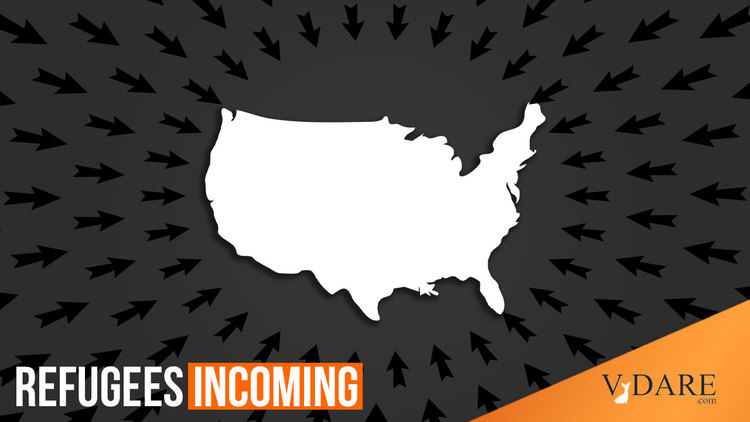

08/11/2013
It’s not enough for Obama & Co. that they may be on the brink of importing a mass population of future Democrats (i.e. 46 million in 20 years according to the CBO), but a recent project is to welcome thousands of Syrians as refugees. What could possibly go wrong?
The refugee system has been a handy doorway for enemies to gain entrance to stupid-generous America. One example: after a couple of Iraqi refugees were found to be pursuing jihad, the government rescreened 58,000 now residing in the US who had been recently admitted without adequate investigation.
Below, Iraqis Waad Ramadan Alwan and Mohanad Shareef Hammadi entered the US as refugees, but their terrorist activities made them long-term jailbirds.
The fear of jihadists using America’s permissive refugee program is well founded and has even been noticed in Washington. Last December the House Homeland Security held a hearing titled Terrorist Exploitation of Refugee Programs. Chairman Patrick Meehan’s noted in his opening statement that “intelligence indicates that the threat posed by refugees with ties to al Qaeda is much broader than was previously believed.” But the bureaucrats promise to do better in the future, for sure!
Below is the Chairman’s opening statement:
Obama dropped hints for a couple months about wanting Syrian refugees, but now there’s a number: 2000. It’s not a huge number by itself, but the door is now open to many more. And though Syria is 90 percent Muslim, one could safely guess that 100 percent of the refugees will be worshippers of Allah. Christians stuck in ummah territory are apparently unwelcome. Why does the administration continue to welcome tribes unfriendly to American values who present a national security threat?
Exclusive: U.S. Will Now Let in Thousands of Syrian Refugees, The Cable (Foreign Policy), August 8, 2013
With conditions continuing to deteriorate in Syria, the Obama administration is making a major policy shift by agreeing for the first time to allow thousands of new Syrian refugees into the United States, The Cable has learned.
The numbers are relatively small: just 2,000 refugees, compared to an estimated two million people who have fled Syria during the civil war. But it’s a significant increase from the 90 or so Syrian refugees who have been permanently admitted to the U.S. in the last two years. And it’s not entirely uncontroversial. The refugees, mostly women and children, will be screened for terrorist ties — a process that could take a year or more to complete.
Unlike previous efforts by the Department of Homeland Security to give temporary protected status to Syrians already in the United States, the State Department effort will bring in Syrians from overseas for permanent resettlement in America.
“Referrals will come within the next four months. We will need to interview people and perform security and medical checks,” Kelly Clements, the State Department’s deputy assistant secretary for Population, Refugees, and Migration, tells The Cable.
While aid workers welcome the decision to let in more refugees, concerns remain about the time it will take to process the applications and move them into the U.S. “It’s 90 degrees now, but in a few months it’s going to snow and people are going to be freezing,” Noah Gottschalk, Oxfam America’s senior humanitarian policy advisor, told The Cable. “They don’t have many options and many are living in unfinished buildings, abandoned shopping malls, schools, mosques and parking garages.”
But the eligible refugees will have to wait out the cold. By Clements’ own admission, given application processing times, “We’re not likely to see Syrian refugees into those numbers before well into 2014.”
Qualifying refugees include only the most vulnerable individuals — likely women and children — who were “exposed to everything from torture to gender-based violence to serious medical conditions” and have no intention of returning to Syria, Clements added.
Despite their vulnerable condition, even the youngest of children will be thoroughly vetted to ensure they do not pose a national security threat. It’s not that they’re worried about infants enlisting in al Qaeda. The worry is that terrorist relatives can more easily enter the United States, once they have relatives in America. “Refugees are subject to an intensive security screening process involving federal intelligence, law enforcement, defense, and homeland security agencies,” a State Department official said. “The U.S. government makes every possible effort to uphold and enhance the security screening aspects of the U.S. Refugee Admissions Program. Refugees are among the most carefully screened of individuals traveling to the United States.”
In cases such as Iraq and Afghanistan, Congress and the White House have been wary about opening the floodgates to refugees too wide, citing concerns about terrorism. As a result, tens of thousands of refugees have been left waiting at the doors of American embassies there. Humanitarian groups are encouraging Washington to do more in Syria.
“It’s a welcome move by the U.S. but they also need to do more to help the countries supporting refugees and support their infrastructure,” said Gottschalk, who has recently visited the refugee camps in Lebanon and Jordan. Other major resettlement countries, such as Germany, have pledged to bring in up to 13,000 refugees since the fighting began. However, unlike in the U.S., refugees to Germany are required to return after the fighting subsides. “We’re very proud of the fact that the U.S. judges applicants on need and seek out the most needy cases,” Erol Kekic, director of immigration at the Church World Service, tells The Cable.
The referrals come from the United Nations Office of the High Commissioner for Refugees, which has been identifying and tracking the millions of refugees flooding into Jordan, Lebanon, Turkey and elsewhere since the two-year-old conflict began. Earlier this summer, the United Nations approached Washington about referring Syrian refugees to a group of 27 resettlement countries, including the United States. Now, Clements tells The Cable the U.S. will not only participate but “will encourage other resettlement countries to do the same.”
It’s yet to be seen if Congress will push back against the Obama administration’s acceptance of the Syrian refugees. (Ordinarily, the U.S. only admits refugees after a conflict has gone on for five years or longer.) Though the State Department’s refugee admission program is authorized by a presidential determination, it does involve consultation with Congress.
Of course, admitting 2,000 Syrians won’t even begin to ease the suffering of Syria’s refugees; the U.N. estimates that by the end of 2013, 3.5 million Syrians will have fled the country. It’s also worth noting the 6.8 million Syrian people in need of humanitarian assistance. Clements emphasized that permanent resettlement is just one means by which the U.S. is contributing to the humanitarian relief effort. “We are exceedingly frustrated to be quite honest because we can’t keep up with the humanitarian need especially inside Syria,” Clements said. “We are expanding our support for humanitarian assistance through all sorts of angles, but we can’t keep up.”
This is a content archive of VDARE.com, which Letitia James forced off of the Internet using lawfare.